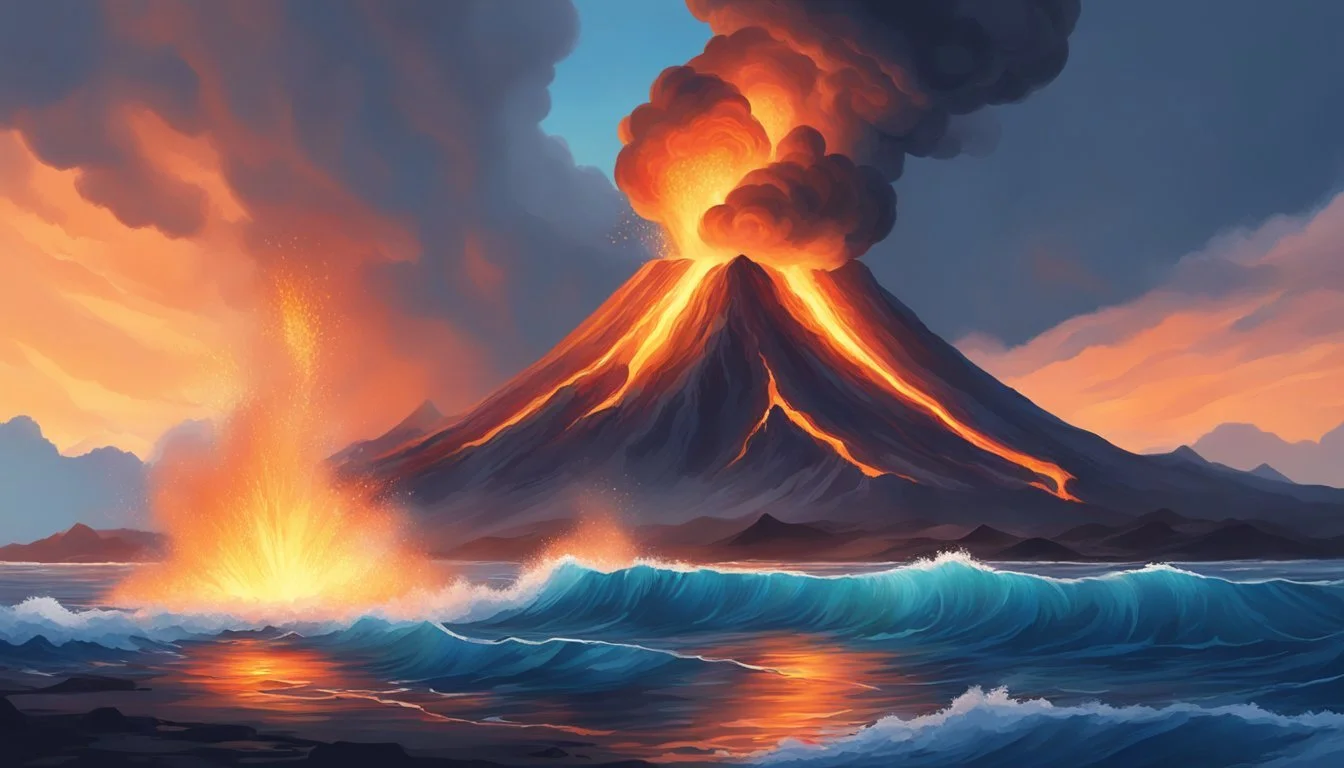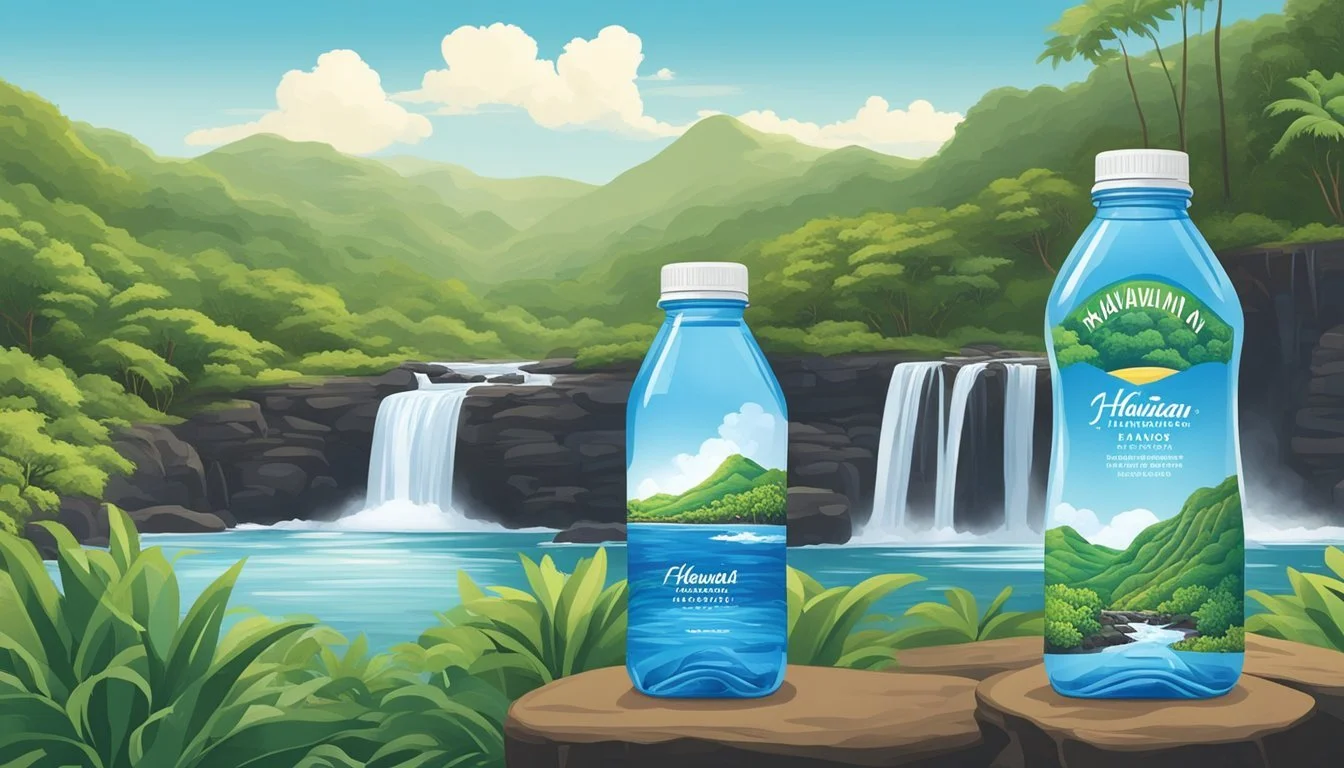Hawai’i Volcanic vs. Skyra
Which Bottled Water is Better?
When it comes to premium bottled water, two names often stand out: Hawai’i Volcanic and Skyra. Both brands boast unique origins and promise health benefits, but how do they truly compare? For those seeking a crisp, refreshing taste with a unique mineral profile, Hawai’i Volcanic often emerges as a distinct favorite.
Hawai’i Volcanic water is sourced from the pristine volcanic regions of Hawaii, known for its naturally filtered water through volcanic rock. This results in a water rich in minerals but slightly acidic with a pH of about 5. In contrast, Skyra originates from Iceland's untouched landscapes and offers a more balanced pH level, which some might prefer for daily consumption.
Taste is subjective, but many consumers describe Hawai’i Volcanic as having a velvety texture with a mild, sweet hint, while Skyra is praised for its clean, neutral flavor. When choosing between the two, those who prioritize a unique mineral taste and the exotic allure of Hawaiian landscapes might opt for Hawai’i Volcanic, whereas those seeking a more neutral, pure experience might lean towards Skyra.
Origin and Source
Understanding the origins and sourcing methods of Hawai’ian Volcanic Water and Skyra's Source is crucial for appreciating the distinct qualities each brand offers.
Hawai'ian Volcanic Water
Waiakea Hawaiian Volcanic Water originates from Hilo, Hawai’i, and is filtered through the porous lava rock of the Mauna Loa volcano. This natural filtration system enriches the water with minerals, giving it a unique, crisp taste.
Sourcing:
Location: Hilo, Hawai’i
Filtration: Porous volcanic rock, specifically from Mauna Loa
Mineral Content: Naturally enriched by volcanic processes
Sustainability: Waiakea emphasizes sustainable practices, such as carbon neutrality and ethical water sourcing.
These practices ensure that Waiakea not only provides refreshing water but also contributes positively to the environment and community health.
Skyra's Source
Skyra's water, sourced from a pristine glacial environment, offers a different kind of purity. The water is extracted from Icelandic glaciers, where it undergoes a natural filtration process through ancient lava fields.
Sourcing:
Location: Iceland
Filtration: Porous lava fields, providing a high level of natural purity
Water Source: Glacial meltwater
Quality: Maintains a clean, refreshing taste due to minimal human intervention
Skyra’s source leverages the untouched glacial landscapes of Iceland, delivering water that is both pure and naturally filtered, emphasizing the brand's dedication to high-quality natural spring water.
Water Quality and Purity
Examining the water quality and purity of Hawai’i Volcanic and Skyra involves evaluating their filtration processes, mineral content, and adherence to safety standards.
Filtration Processes
Hawai’i Volcanic and Skyra utilize different filtration techniques to ensure clean water. Hawai’i Volcanic benefits from natural volcanic filtration as the water passes through layers of volcanic rock. This process helps remove impurities and adds natural minerals.
Skyra, sourced from Iceland, employs multi-stage filtration. This includes microfiltration, reverse osmosis, and UV treatment to ensure purity. While volcanic filtration emphasizes natural methods, Skyra's approach incorporates advanced technology to achieve comparable results.
Mineral Content and Health Benefits
Mineral content plays a crucial role in determining the health benefits of bottled water.
Mineral Hawai’i Volcanic Skyra Silica High Moderate Calcium Moderate High Potassium Moderate Moderate Magnesium High High Total Dissolved Solids (TDS) Approximately 40 ppm Varies, generally low
Hawai’i Volcanic contains silica, calcium, potassium, and magnesium, contributing to health benefits like enhanced bone strength and cardiovascular health. Skyra also provides essential minerals, particularly noted for its high calcium content, beneficial for bone health.
Testing and Safety Standards
Both brands adhere to stringent testing and safety standards to ensure consumer safety.
Hawai’i Volcanic is tested rigorously for purity, ensuring low levels of contaminants. Their water typically has a TDS of around 40 ppm, indicating a low concentration of dissolved impurities.
Skyra implements frequent testing and monitoring to comply with European and international safety standards. This includes regular chemical and microbiological testing to ensure no harmful contaminants are present.
Both brands' commitment to safety and purity offers consumers confidence in the quality of the water they are drinking.
Taste and pH Balance
When comparing Hawai’i Volcanic and Skyra, their distinct taste profiles and pH balances play a key role in choosing the best bottled water. Both brands emphasize their naturally alkaline properties and unique mineral compositions.
Hawai’i Volcanic's Flavor Profile
Hawai’i Volcanic water has a naturally alkaline pH range of 7.7 to 8.4. This water is sourced from Mauna Loa, filtering through 15,000 feet of volcanic lava rock. The process enriches the water with essential minerals and electrolytes.
The flavor profile of Hawai’i Volcanic is often described as smooth and crisp. Its alkalinity contributes to a slightly sweet taste, which is refreshing and appeals to those who enjoy a mild mineral presence. The even pH balance ensures consistency in taste with each bottle.
Skyra's Taste and Alkalinity
Skyra water also boasts a naturally alkaline pH, ranging from 8.1 to 8.4. Sourced from Iceland, it passes through layers of volcanic rock, which infuses the water with minerals such as calcium and magnesium.
Skyra’s taste can be characterized as clean and pure, with a subtle mineral aftertaste that highlights its volcanic origins. The higher end of its pH range provides a more alkaline flavor, appealing to those who prefer a slightly more distinctive and robust taste. The combination of a high pH level and mineral content offers a refreshing drinking experience.
Health and Wellness
When choosing between Hawai’i Volcanic and Skyra for health and wellness, several elements such as hydration, electrolytes, and specific health benefits come into play. Both water brands aim to offer superior hydration, yet their additional health advantages distinguish them from each other.
Hydration and Electrolytes
Hawai’i Volcanic and Skyra both emphasize optimal hydration. Hawai’i Volcanic contains essential electrolytes like potassium, magnesium, and calcium, which help maintain fluid balance and support muscle function. These electrolytes make it an ideal choice for athletes or anyone seeking enhanced hydration.
Skyra, on the other hand, originates from Icelandic glacial sources and boasts a naturally high mineral content. It has calcium, magnesium, and silica, providing a robust profile for hydration. These minerals assist in replenishing the body's electrolyte reserves post-exercise.
Both waters employ natural filtration processes that preserve their mineral content without artificial additives. This natural approach assures consumers of their purity and effectiveness for daily hydration needs.
Health Advantages
Hawai’i Volcanic sets itself apart with its alkaline pH level of around 8.2-8.8, which can help neutralize body acidity. Supporters believe alkaline water can improve digestion and reduce acid reflux. Its high-quality filtration through volcanic rock enhances its mineral content, which is believed to offer additional health benefits such as supporting bone health.
Skyra similarly provides health advantages with its pristine glacial water and naturally occurring minerals. With a pH level close to neutral, it helps balance body fluids without affecting the body's natural pH level excessively. This balance is crucial for maintaining healthy metabolism and urinary function.
Both brands cater to individuals seeking water that is not only hydrating but also contributes positively to their overall well-being.
Environmental Impact and Sustainability
Both Hawai’i Volcanic and Skyra emphasize eco-friendliness and brand initiatives aimed at sustainability and conservation. Each brand's commitment to reducing environmental impact varies and includes efforts like using recyclable materials and supporting conservation projects.
Bottled Water and Eco-friendliness
Both Hawai’i Volcanic and Skyra have adopted environmentally friendly practices in their production and packaging. Hawai’i Volcanic uses recyclable and BPA-free materials for their bottles. This reduces the risk of harmful chemicals leaching into the water and makes it easier for consumers to recycle their bottles.
Similarly, Skyra promotes the use of reusable bottles and rPET (recycled polyethylene terephthalate) materials. These practices are crucial in minimizing the carbon footprint and conserving natural resources. Additionally, both companies encourage the use of reusable bottles to further reduce plastic waste.
Brand Initiatives
Hawai’i Volcanic is deeply committed to sustainability and conservation. They contribute a portion of their profits to environmental causes and local communities. Their initiatives emphasize reducing their ecological impact while promoting clean water access and educational opportunities in underprivileged areas.
Skyra has also taken steps to give back by partnering with organizations that focus on conservation and sustainable water sources. They work closely with their partners such as Pump Aid to ensure clean water access in communities that may not have reliable water sources. Both brands prioritize ethical practices and sustainability in their business models.
By focusing on reducing plastic waste, using sustainable materials, and engaging in community support, both Hawai’i Volcanic and Skyra demonstrate a strong commitment to environmental stewardship.
Packaging and Convenience
Examining the packaging materials and convenience options of Hawai’i Volcanic and Skyra reveals noteworthy aspects that impact user experience and environmental sustainability.
Material and Design Considerations
Hawai’i Volcanic prides itself on using aluminum for its bottles. Aluminum is not only lightweight but also highly recyclable, making it an eco-friendly choice. Additionally, their bottles are often reusable, which adds to their sustainability credentials.
In comparison, Skyra opts for rPET (recycled PET) material. This choice ensures their bottles are BPA-free, addressing health concerns associated with plastic. rPET is also recyclable and supports the circular economy by reusing existing plastic.
Both brands employ thoughtful design elements aimed at convenience. Hawai’i Volcanic’s bottles have a sleek, easily portable design. Skyra’s bottles feature ergonomic shapes that make them comfortable to hold.
Access and Availability
Hawai’i Volcanic is prominently available through various outlets including Whole Foods Market and Amazon. They also offer a subscription service, making it easier for consumers to receive regular deliveries without worrying about reordering.
Skyra can be found at many large retailers as well and emphasizes their accessibility through subscription options. This ensures consistent availability, a boon for regular consumers.
Both brands support online shipping, facilitating easy access regardless of location. While both are widely available, the added convenience of subscription services makes them an even more attractive option for those prioritizing regular access and minimal effort in procurement.
Cost Comparison
When choosing between Hawai’i Volcanic and Skyra, the cost can be a significant factor. Both brands offer unique attributes that could influence their price points, such as sustainability practices and health benefits.
Affordability
Hawai’i Volcanic tends to be on the higher end of the price spectrum. This premium cost is often justified by its origin and the meticulous process involved in bottling volcanic water from Hawaii. Consumers can expect to pay around $3.00 to $4.00 per bottle, making it a less budget-friendly option.
Skyra, sourced from Iceland, also falls into the premium bottled water category. However, it often comes at a slightly lower price point than Hawai’i Volcanic. A typical price for Skyra is around $2.50 to $3.50 per bottle, which still positions it as a premium choice but slightly more affordable than its Hawaiian counterpart.
Value for Money
When considering the value for money, both Hawai’i Volcanic and Skyra offer various benefits that justify their premium prices.
Hawai’i Volcanic promotes its water as naturally alkaline and rich in essential minerals, which can enhance health benefits. Additionally, the brand emphasizes sustainability, using recycled and recyclable materials, enhancing its appeal to environmentally conscious consumers.
Skyra benefits from Icelandic purity, being sourced from one of the cleanest environments in the world. Its water is naturally filtered through volcanic rock, which can add mineral richness. Skyra also highlights its commitment to sustainability with eco-friendly packaging.
Both brands provide elevated quality and numerous benefits, but the choice may come down to the individual consumer's priorities in terms of cost, health benefits, and sustainability.
Final Thoughts
When comparing Hawai’i Volcanic and Skyra, several key aspects come to the forefront.
Taste
Hawai’i Volcanic boasts a distinct, crisp taste originating from its volcanic source, appealing to many who prefer a clean flavor.
Skyra also offers a refreshing taste, sourced from Icelandic glaciers, resulting in a slightly smoother finish.
Health Benefits
Hawai’i Volcanic is rich in minerals due to its volcanic filtration process. This water contains natural electrolytes which can aid in hydration.
Skyra emphasizes its purity, being naturally low in minerals. It's an excellent option for those seeking a light and clean drinking experience.
Sustainability
Both brands prioritize environmental responsibility.
Hawai’i Volcanic uses eco-friendly packaging and highlights its commitment to reducing plastic waste.
Skyra echoes these efforts with recyclable materials and a focus on protecting Iceland’s natural resources.
Overarching Appeal
Hawai’i Volcanic clearly stands out for those who value mineral-rich hydration and a distinct taste, with the added bonus of sustainable practices.
Skyra attracts consumers looking for pristine, pure water with a commitment to environmental sustainability but with a more subtle taste profile.
Choosing between Hawai’i Volcanic and Skyra boils down to personal preference in taste and desired health benefits, while both brands excel in their commitment to sustainability.
More About Hawai’i Volcanic
Acqua Pana vs Hawaii Volcanic: Which Bottled Water is Better?
Antipodes vs Hawaii Volcanic: Which Bottled Water is Better?
Aqua Carpatica vs Hawaii Volcanic: Which Bottled Water is Better?
Arrowhead vs Hawaii Volcanic: Which Bottled Water is Better?
Boxed Water vs Hawaii Volcanic: Which Bottled Water is Better?
Castle Rock vs Hawaii Volcanic: Which Bottled Water is Better?
Core Hydration vs Hawaii Volcanic: Which Bottled Water is Better?
Deer Park vs Hawaii Volcanic: Which Bottled Water is Better?
Hawaii Volcanic vs 1907water: Which Bottled Water is Better?
Hawaii Volcanic vs Alkaline88: Which Bottled Water is Better?
Hawaii Volcanic vs Big Chill: Which Bottled Water is Better?
Hawaii Volcanic vs BodyArmor: Which Bottled Water is Better?
Hawaii Volcanic vs Cascade Mountain: Which Bottled Water is Better?
Hawaii Volcanic vs CBD Living: Which Bottled Water is Better?
Hawaii Volcanic vs Crystal Geyser: Which Bottled Water is Better?
Hawaii Volcanic vs Crystal Lake: Which Bottled Water is Better?
Hawaii Volcanic vs Essence pH10: Which Bottled Water is Better?
Hawaii Volcanic vs Kirkland Signature: Which Bottled Water is Better?
Hawaii Volcanic vs Liquid Death: Which Bottled Water is Better?
Hawaii Volcanic vs Open Water: Which Bottled Water is Better?
Hawaii Volcanic vs Proud Source: Which Bottled Water is Better?
Hawaii Volcanic vs Pure Life: Which Bottled Water is Better?
Hawaii Volcanic vs Purely Sedona: Which Bottled Water is Better?
Hawaii Volcanic vs Richard's Rainwater: Which Bottled Water is Better?
Hawaii Volcanic vs Simple Truth: Which Bottled Water is Better?
Hawaii Volcanic vs Talking Rain AQA: Which Bottled Water is Better?
Hawaii Volcanic vs Weird Water: Which Bottled Water is Better?
Hawaii Volcanic vs Whole Foods 365: Which Bottled Water is Better?
Hawaii Volcanic vs Whole Foods Italian Still Mineral water: Which Bottled Water is Better?
Hawaiian Springs vs Hawaii Volcanic: Which Bottled Water is Better?
Ice Mountain vs Hawaii Volcanic: Which Bottled Water is Better?
Icelandic Glacial vs Hawaii Volcanic: Which Bottled Water is Better?
Just Water vs Hawaii Volcanic: Which Bottled Water is Better?
Mountain Valley Spring Water vs Hawaii Volcanic: Which Bottled Water is Better?
Nestle Pure Life vs Hawaii Volcanic: Which Bottled Water is Better?
Poland Spring vs Hawaii Volcanic: Which Bottled Water is Better?
San Pellegrino vs Hawaii Volcanic: Which Bottled Water is Better?
Smartwater vs Hawaii Volcanic: Which Bottled Water is Better?
Solan de Cabras vs Hawaii Volcanic: Which Bottled Water is Better?
Topo Chico vs Hawaii Volcanic: Which Bottled Water is Better?
Zephyrhills vs Hawaii Volcanic: Which Bottled Water is Better?







